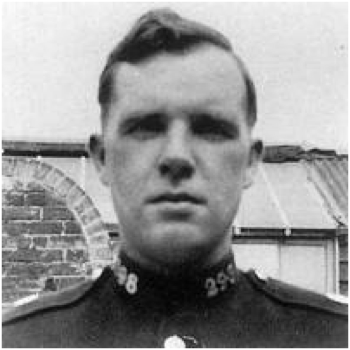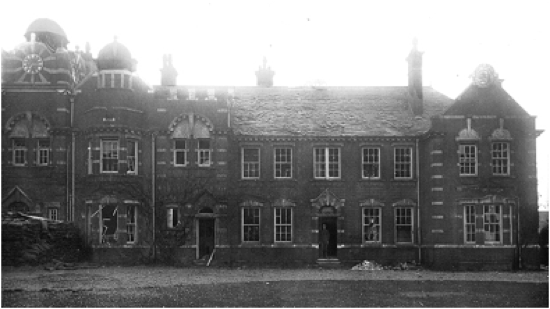Maurice George ‘Dixie’ Lee was the son of a farm labourer. He served in the army from 1928 to 1935 and on leaving became a police officer with the Essex County Constabulary. He married in 1937. With the outbreak of war he was transferred to Police Headquarters where his linguistic ability was put to use on translation and alien work. In November 1940 he was fatally injured at Police Headquarters by a bomb and died shortly afterwards in hospital. His home was in Springfield Park Lane, Springfield.
Maurice George LEE, Civilian
Fatally injured in an air raid on Police Headquarters, Chelmsford. Aged 29
At the time of his death Dixie’s home was at 8 Springfield Park Lane in Chelmsford, while his parents were living at Small Shoes in Good Easter.
Dixie was buried at St. Andrew’s Church in Good Easter. His widow died on March 21st 1985, aged 75 and was buried with her husband. Dixie's mother and father died in 1961 and 1977 respectively.
George Henry Rookwood Totterdell, a detective superintendent in Essex County Constabulary, who lived near police headquarters later wrote about the incident:
“I was at home when the air-raid siren sounded, and was about to leave to go to my office at headquarters. I stood on the front door-step of my house for a few moments watching the searchlights. Eventually they succeeded in getting one plane in the full beam, and the anti-aircraft fire became very intense.
The plane took violent evasive action to escape, and, as it appeared to have done so, I left and walked down the road towards my office. I was within twenty yards of headquarters buildings when I heard the screeching of a salvo of bombs coming in my direction, Instinctively I threw myself face downwards under an archway over the road. I started t count the bombs as they fell, and had reached up to five when I lost count. The archway was rocking, and debris was falling all around me.
I got up when the last of the sixteen bombs had fallen. Owing to the clouds of dust and the darkness, I was quite unable to see anything. I quite expected to find headquarters flattened and was surprised to discover that it had escaped with a near miss, though the Chief Constable’s house had been damaged.
I groped my way towards the main entrance of the building, normally guarded by an armed constable, and found there was a large crater near the entrance. Police Constable Scott, who was performing guard duty, was lying near by with terrible injuries. Continuing the search, I came across the body of my interpreter - Detective Constable Lee. He also was in a bad way, and both succumbed to their injuries.
If I had not stopped for these few moments on the step of my own house I too might have been killed.”
120128

Dixie was born in the Chelmsford registration district in 1911, the son of Harry Lee and Isabella ‘Isabel’ Lee (nee Lee).
His parents had married the previous year, probably in Good Easter. Dixie had an elder sibling who died in infancy.
He served with the Essex Regiment from 1928 to 1935 and on 6th November 1935 joined Essex County Constabulary where he was police constable 298.
Dixie was posted initially to Grays, and then to Hatfield Heath, where he met his future wife, Florence Rachel Brain. The couple married in 1937.
During a period of unemployment he had learned foreign languages and with the outbreak of the Second World War his linguistic ability in German and Dutch meant he was transferred to the Criminal Investigations Department at
Police Headquarters in Chelmsford todeal with aliens and translation work.
At 7.17 p.m. on 16th November 1940 Dixie was guarding Police Headquarters with a colleague Alexander Simpson Scott when, following an air raid siren, a number of German aircraft had appeared in the night sky above Chelmsford. One of the enemy raiders was captured by the local searchlights and targeted by intense anti-aircraft fire. As the pilot took violent evasive action to escape, his aircraft released the stick of bombs that fell in a line from Police Headquarters to fields adjoining Chelmer Road.
The first high explosive bomb blew up on the gravel forecourt of Police Headquarters almost directly beneath the clock and only a few yards in front of the main building. Although sand bagging around the ground floor absorbed much of the blast Dixie and Alexander were caught in the open close to the bomb.
29 year-old Dixie was grievously wounded by the explosion from bomb splinters and falling masonry and was to die shortly afterwards at the Chelmsford and Essex Hospital. His colleague was killed instantly.
Blast from the device caused extensive superficial damage to the roof, windows and ceilings throughout Police Headquarters. The protective sandbagging was dislodged and corrugated steel sheets and other debris thrown across the courtyard. An early assessment reported that not a single window at headquarters had survived unscathed. Dozens of houses in the adjacent residential areas also suffered from the explosion.

